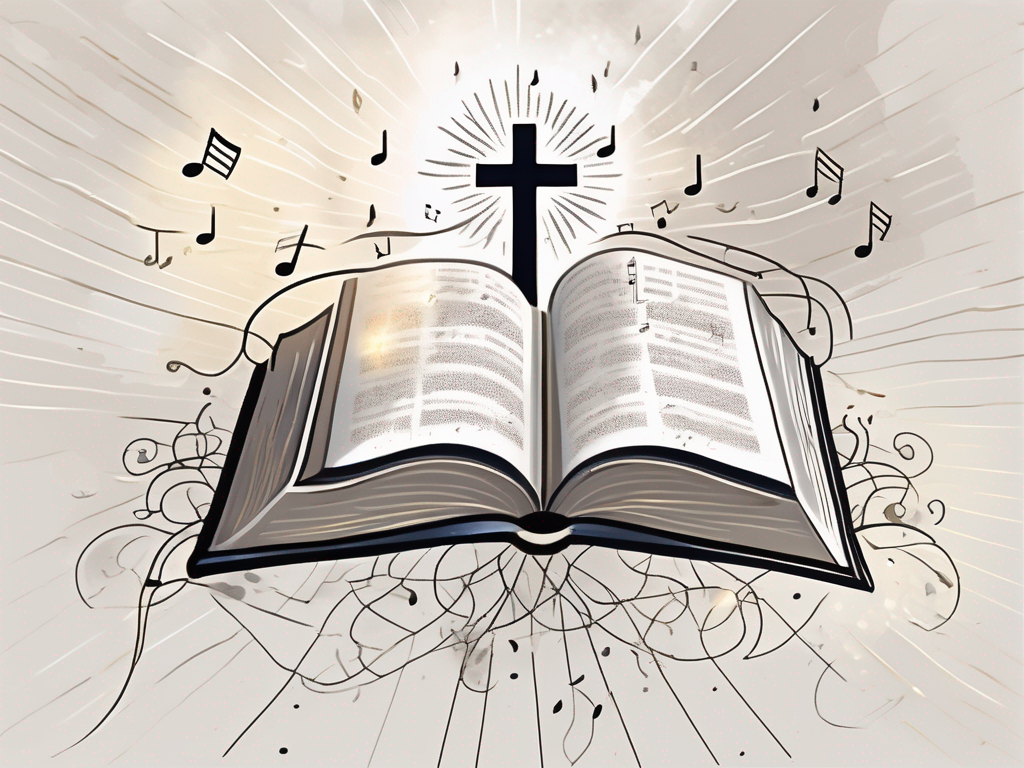King David is a significant figure in Christianity, his influence reaching deep into the foundations of the faith. Through his life, reign, role in the Old Testament, and his impact on Christian worship, as well as the theological perspectives surrounding him, King David’s presence echoes throughout Christian history.
Understanding King David: His Life and Reign
Let’s begin by exploring the life and reign of King David. It all started with the anointing of David, an event that held great significance in the Old Testament. David’s anointing as king by the prophet Samuel showcased God’s choice and favor upon him. This act marked the transition from the era of the judges to the establishment of the monarchy in Israel.
David’s anointing was not a mere formality, but a powerful moment that set the stage for his future as the ruler of Israel. As Samuel poured the sacred oil over David’s head, the Spirit of the Lord came upon him, empowering him for the task ahead. It was a divine commissioning that would shape the destiny of the nation.
David’s reign was filled with both triumphs and challenges. He led Israel to numerous victories against its enemies, including the famous encounter with Goliath, a story rooted in faith and courage. The young shepherd boy, armed with only a sling and five smooth stones, fearlessly faced the giant warrior. With unwavering trust in God, David struck down Goliath, securing a monumental victory for Israel.
But David’s life was not without its share of hardships. He faced betrayal from those closest to him, such as his own son Absalom, who rebelled against him and sought to take the throne. David’s heart was heavy with grief as he mourned the loss of his son and the division within his kingdom. Yet, even in the midst of these trials, David turned to God, seeking His guidance and finding solace in His presence.
David’s relationship with God was central to his success. He was known for his deep devotion and his ability to recognize and repent of his sins, serving as a model for all believers. The Psalms, written by David, reflect his intimate connection with God. Through these poetic expressions of praise, lament, and supplication, David poured out his heart before the Lord, finding comfort and strength in His unfailing love.
As a leader, David was not perfect, but he possessed qualities that endeared him to his people. He was a man of integrity, displaying fairness and justice in his judgments. He surrounded himself with wise counselors and sought to govern with wisdom and discernment. Under his rule, Israel experienced a period of prosperity and stability, becoming a respected nation among its neighbors.
David’s legacy extends far beyond his time on earth. His reign marked a pivotal moment in Israel’s history, laying the foundation for the future kings and the eventual coming of the Messiah. The promise made to David, that his throne would be established forever, found its fulfillment in Jesus Christ, the Son of David, who reigns eternally as King of kings.
King David’s Role in the Old Testament
David’s prominence extended beyond his personal life and into the pages of the Old Testament. His story, interwoven with God’s promises and prophecies, played a crucial part in shaping the Messianic expectations of ancient Israel.
The Davidic Covenant, an agreement with God, promised that David’s lineage would produce a forever-reigning king. This covenant found its fulfillment in Jesus Christ, the ultimate descendant of David. By tracing Jesus’ lineage back to David, the Gospel writers established Jesus’ royal connections and highlighted the messianic nature of his ministry.
Let’s delve deeper into the life and reign of King David. Born in Bethlehem, David was the youngest son of Jesse. He was anointed by the prophet Samuel to be the future king of Israel, even though he was just a shepherd boy at the time. This unexpected choice by God demonstrated His ability to see beyond outward appearances and choose a leader based on the heart.
David’s rise to power was not without challenges. He faced the mighty Philistine warrior, Goliath, and defeated him with a single stone from his sling. This victory catapulted David into the national spotlight and earned him the admiration of the people. However, his success also fueled the jealousy and insecurity of King Saul, who sought to kill him out of fear of being overshadowed.
Despite Saul’s attempts to eliminate him, David remained faithful to God and refused to harm the anointed king. He even had opportunities to take Saul’s life but chose instead to spare him, recognizing the importance of honoring God’s chosen leader. This act of mercy and respect showcased David’s character and deep reverence for God’s sovereignty.
After Saul’s death, David was anointed as the king of Judah and later became the king of all Israel. His reign was marked by military victories, political alliances, and the establishment of Jerusalem as the capital city. David’s leadership brought stability and prosperity to the nation, and he is often remembered as one of Israel’s greatest kings.
However, David’s life was not without its flaws. His affair with Bathsheba, the wife of Uriah, and subsequent cover-up revealed a darker side of his character. Despite this moral failing, David demonstrated true repentance when confronted by the prophet Nathan. He acknowledged his sin, sought forgiveness from God, and wrote heartfelt psalms expressing his remorse and longing for restoration.
David’s legacy extends beyond his political achievements. He is also known as the author of many of the Psalms, which continue to inspire and comfort people to this day. These poetic expressions of praise, lament, and trust in God reveal the depth of David’s relationship with the Almighty.
As we reflect on King David’s role in the Old Testament, we see a complex figure whose life was filled with triumphs and failures. His story serves as a reminder that even the most flawed individuals can be used by God to accomplish great things. David’s lineage leading to Jesus Christ underscores the divine plan of redemption and the fulfillment of God’s promises throughout history.
David’s Influence on Christian Worship
The impact of King David is especially felt in Christian worship. The Book of Psalms, attributed to David, constitutes a significant portion of Christian liturgy. These poetic expressions of faith, penned by David and others, provide comfort, inspiration, and guidance for believers throughout history.
David’s influence on Christian worship goes beyond the mere inclusion of the Psalms in liturgical practices. His life and experiences serve as a source of inspiration for believers seeking a deeper connection with God. The Psalms, with their raw emotions and honest expressions of joy, sorrow, and longing, resonate with individuals in various seasons of life.
Moreover, David’s legacy in Christian music and hymnody cannot be overstated. Over the years, countless songs and hymns have been inspired by the Psalms, giving voice to the praises and prayers of believers worldwide. From the majestic melodies of classical compositions to the energetic rhythms of contemporary worship music, David’s influence continues to shape the sounds of Christian worship.
When we sing songs like “Great is Thy Faithfulness” or “How Great Thou Art,” we are tapping into the rich tradition of Davidic worship. These hymns, rooted in the Psalms, allow us to express our adoration and gratitude to God in a way that connects us to the worshipers of old. The timeless nature of David’s words transcends cultural and generational boundaries, uniting believers across time and space.
Furthermore, David’s impact on Christian worship extends beyond the realm of music. His life serves as a reminder that worship is not confined to a specific location or activity. David’s example of wholehearted devotion to God, even in the midst of trials and triumphs, inspires believers to approach worship as a lifestyle rather than a mere Sunday morning routine.
As we delve into the Psalms and explore the depths of David’s relationship with God, we find a treasure trove of wisdom and insight. The Psalms teach us to pour out our hearts before God, to seek His guidance and comfort, and to trust in His faithfulness. They remind us that worship is not just about singing songs, but about surrendering our lives to the One who is worthy of all praise.
In conclusion, David’s influence on Christian worship is profound and far-reaching. Through the Psalms, his words continue to inspire and shape the worship practices of believers worldwide. Whether through music, prayer, or a lifestyle of devotion, David’s legacy serves as a constant reminder of the power and beauty of worshiping God.
Theological Perspectives on King David
From a theological standpoint, King David holds a unique place in Christian doctrine. His story emphasizes both grace and repentance—a reminder that even great leaders and heroes can fall but can also find redemption through sincere repentance.
Moreover, King David’s life and teachings influenced Christian ethics and morality. His commitment to justice, righteousness, and compassion serve as a timeless example for believers seeking to live out their faith in the world. David’s legacy continues to inspire Christians to strive for moral integrity and to treat others with love and kindness.
As we reflect on the influence of King David in Christianity, we are reminded of the richness and diversity of this faith. From the personal lessons we learn from David’s life and reign to the wider theological perspectives and the impact on Christian worship, King David’s influence is profound and enduring. May his example continue to guide and inspire believers today.












